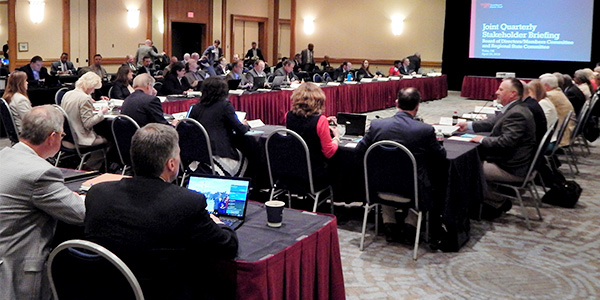By Tom Kleckner
TULSA, Okla. — SPP’s Holistic Integrated Tariff Team (HITT) last week shared with stakeholders the result of a year’s worth of work: a draft report of high-level recommendations addressing the footprint’s many challenges.
Now comes the hard part: taking action on the recommendations.
“There’s a heck of a lot of work that’s left,” HITT Chair Tom Kent said during SPP’s April 29 joint quarterly stakeholder briefing. “The working groups will have a lot of effort to put these [recommendations] into actual action.”
Kent, COO for Nebraska Public Power District, said the HITT report makes 21 recommendations in four categories: reliability, marketplace, planning and cost allocation, and strategy. Thirteen of the recommendations, some of which are already in progress, are planned for implementation; the other eight require further study.
The big-ticket cost-allocation recommendations include decoupling Schedule 9 and Schedule 11 transmission pricing zones and allowing the creation of larger Schedule 11 pricing zones and/or Schedule 9 sub-zones. The HITT proposes that if the Regional State Committee adopts a policy to reallocate existing costs within the new pricing zones, it should be done over a five- to 10-year transition period to mitigate cost shifts.
The HITT is also recommending SPP determine whether transmission projects below 300 kV can be fully allocated on a regionwide basis; use incremental long-term congestion rights instead of Attachment Z2 credits as compensation for new sponsored upgrade projects; and evaluate whether it can establish cost allocation and rates under the Tariff for energy storage resources.
The team also recommends SPP continue to improve the Integrated Marketplace by including fast-start resource logic, ramping capability and a multiday, longer-term market product, and to continue developing a market mechanism to hedge load against congestion charges.
Kent said the report is a “tribute to the team working hard and working together, and coming to a strong consensus on the recommendations.”
A proposed action plan assigns the recommendations to various stakeholder groups. A timeline anticipates the work being completed by mid-2021.
Larry Altenbaumer, chair of SPP’s Board of Directors, called the HITT’s work “an example of the very best of SPP.”
“We fully recognize 85% of the work is in front of us,” he said. “It’s an exciting beginning of a very important next step for us. I think HITT’s going to be a good thing for us.”
“The industry is changing as rapidly as many of us who’ve been around for a long time have seen it change,” said HITT member Dennis Grennan, a commissioner with the Nebraska Power Review Board. “We must prepare for major changes coming in the next five to 10 years. It’s a real challenge, but it needs to be done so that our consumers back home truly benefit from belonging to SPP and all that comes with it.”
Kent promised a final report by the end of June and said that a final product will be brought to the July stakeholder meetings. He said it will be discussed in detail with the Strategic Planning Committee during its May 9 planning retreat.
The RSC has scheduled in-person meetings with the HITT on May 30 and June 24, and Altenbaumer asked for a workshop to be scheduled where stakeholders can participate in a “top-to-bottom” discussion of the report.
The SPP board charged the HITT with developing recommendations for holistic improvements within the system. The team is composed of 15 board members, state regulators and SPP members. (See SPP’s Tariff Team Begins Carving up the Elephant.)







